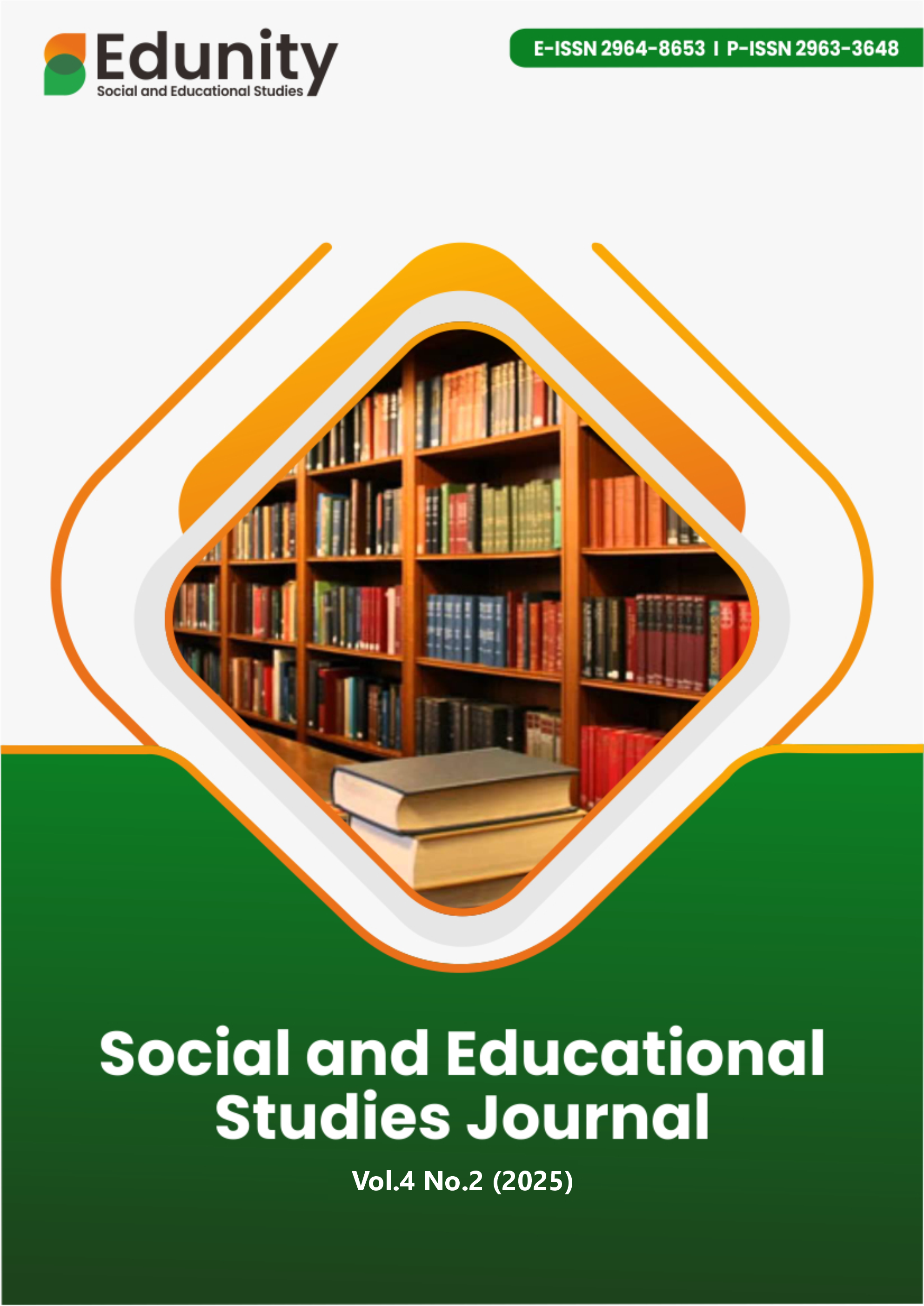Planning in Islamic Education Management: A Study of Irfani's Epistemological Perspective
DOI:
https://doi.org/10.57096/edunity.v4i2.369Keywords:
management planning, irfani epistemology, Islamic educationAbstract
This study aims to examine planning management in Islamic education with the
perspective of Irfani's epistemology, which emphasizes the spiritual and intuitive
dimension in the educational process. This approach is integrated with the epistemology
of Bayani and Burhani as initiated by Muhammad Abed Al-Jabiri, to create a holistic and
comprehensive education system. This research uses a qualitative method with
documentation-based data collection techniques and in-depth interpretation of Al-Jabiri's
main works, such as Takwin al-'Aql al-'Arabi, as well as other supporting literature. Data
analysis is carried out through data reduction, data presentation, and drawing conclusions
using an interpretive and holistic approach. The results of the study show that planning
in Islamic education management based on Irfani's epistemology emphasizes the depth
of spirituality, which is complemented by Bayani's normative foundation and Burhani's
rational analysis. Irfani's approach encourages inner experience, contemplation, and
transcendental relationships with God, which provides a balanced dimension between
the mundane and ukhrawi aspects in educational planning. The discussion also found that
this approach can strengthen the vision and mission of Islamic education in building the
character of kamil people who are integrity, intellectually intelligent, and morally and
spiritually responsible. In conclusion, the integration of these three epistemologies, in
particular with an emphasis on the Irfani perspective, offers a holistic planning
framework, making Islamic education more relevant and adaptive to the challenges of
the times, without neglecting the spiritual values and morality that are its essence.
References
Abid Al-Jabiri, M. (2009). Bunyah al-‘Aql al-‘Arabi (p. 207).
Anam, W., Sulaeman, M., Mustakim, A. A., Putra, A., & Hakim, L. (2024). Quo Vadis
Hadith Studies in Islamic Boarding Schools in Al-Jabiri’s Perspective. Nazhruna:
Jurnal Pendidikan Islam, 7(2), 290–314.
ANDI, N. (2023). Pengaruh Ajaran Thoriqoh Qodiriyah Wa Naqsabandiyah Dalam
Kehidupan Rumah Tangga Masyarakat Perkotaan (Studi Pada Jama’ah Tarekat
Qodiriyah Wa Naqsabandiyah Di Yayasan Alhikmah Bandar Lampung). UIN Raden
Intan Lampung.
Bacud, S. A. D. (2020). Henri Fayol’s principles of management and its effect to
organizational leadership and governance. Journal of Critical Reviews, 7(11), 162
Cavusoglu, H., Cavusoglu, H., Son, J.-Y., & Benbasat, I. (2015). Institutional pressures
in security management: Direct and indirect influences on organizational investment
in information security control resources. Information & Management, 52(4), 385
Fahruddin, Z. (2024). Epistemological Deconstruction of Understanding Material in
Islamic Education as the Existence of a Progressive Dynamic Islamic Education
Paradigm.
Fitri Yunus, A., Sidik, S., & Kamaruddin, K. (2019). The concept of spiritual education
in Surah Ibrahim verses 35-41 According to Muhammad Quraish Shihab.
International Journal of Contemporary Islamic Education, 1(1), 20–47.
Ismail, I., Ali, H., & Us, K. A. (2022). Factors affecting critical and holistic thinking in
Islamic education in Indonesia: self-concept, system, tradition, culture.(Literature
Review of Islamic Education Management). Dinasti International Journal of
Management Science, 3(3), 407–437.
Kadis, K., Imron, A., Mustiningsih, M., & Sumarsono, R. B. (2023). Trends and insights
on multiple intelligences in Islamic schools: A bibliometric analysis.
Mohamed Abed Al-Jabri. (2016). Harmonization between Heritage and Modernism.
Narsinh, K. H., Ramaswamy, R., & Kinney, T. B. (2013). Management of pulmonary
arteriovenous malformations in hereditary hemorrhagic telangiectasia patients.
Seminars in Interventional Radiology, 30(04), 408–412.
Nasucha, M. R., & Khozin, K. (2023). Synergizing islamic religious education and
scientific learning in the 21st century: A systematic review of literature. Jurnal
Pendidikan Agama Islam (Journal of Islamic Education Studies), 11(1), 109–130.
Nuryahman, M., Majeed, M. K., & Zulaiha, D. (2024). Islamic Education Management:
Integration Of Holistic Approaches In Formal And Non-Formal Education.
Leadership: Jurnal Mahasiswa Manajemen Pendidikan Islam, 6(1), 127–143.
Ritonga, M., & Saputra, R. (2025). Epistemology of Knowledge: Bridging Western and
Islamic Thought. Solo International Collaboration and Publication of Social
Sciences and Humanities, 3(01), 95–110.
Sahin, A. (2018). Critical issues in Islamic education studies: Rethinking Islamic and
Western liberal secular values of education. Religions, 9(11), 335.
Sapa, N. Bin. (2025). Evolusi Pemikiran Ekonomi Islam Kajian Komparatif Ayat
Makkiyah Dan Madaniyah. Adpertens: Jurnal Ekonomi Dan Manajemen, 2(1), 25
Taufik, M. (2020). Strategic role of Islamic religious education in strengthening character
education in the era of industrial revolution 4.0. Jurnal Ilmiah Islam Futura, 20(1),
–104.
Ulliyah, A. K., Aulia, E. N., Ikhsan, M. A. W., Ramadhani, R. F., Junaedi, M., & Van
Aarde, T. (2024). Perbedaan Epistemologi Bayani, Irfani dan Burhani dalam
Pemikiran Islam. Revorma: Jurnal Pendidikan Dan Pemikiran, 4(1), 33–44.

Downloads
Published
Issue
Section
License
Copyright (c) 2025 Nurhadi Nurhadi, Masyitoh Masyitoh, Agus Suradika, Saiful Bahri

This work is licensed under a Creative Commons Attribution-ShareAlike 4.0 International License.
Authors who publish with this journal agree to the following terms:
- Authors retain copyright and grant the journal right of first publication with the work simultaneously licensed under aCreative Commons Attribution-ShareAlike 4.0 International (CC-BY-SA). that allows others to share the work with an acknowledgement of the work's authorship and initial publication in this journal.
- Authors are able to enter into separate, additional contractual arrangements for the non-exclusive distribution of the journal's published version of the work (e.g., post it to an institutional repository or publish it in a book), with an acknowledgement of its initial publication in this journal.
- Authors are permitted and encouraged to post their work online (e.g., in institutional repositories or on their website) prior to and during the submission process, as it can lead to productive exchanges, as well as earlier and greater citation of published work.







